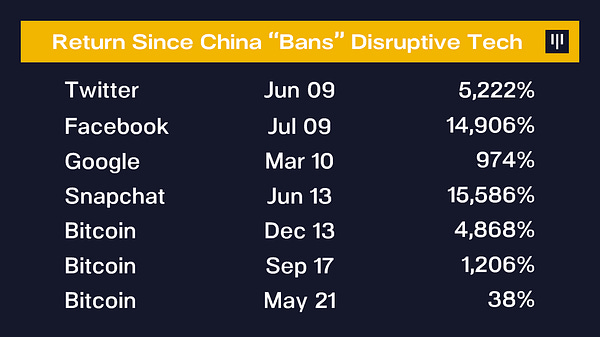To investors,
We discussed last week the issues related to China’s decision to emphasize their existing ban on bitcoin and cryptocurrencies. This ban has manifested itself in multiple ways, including kicking miners out of the country, outlawing cryptocurrency transactions, and recently blocking access to various crypto websites that show asset prices and charts.
There has been plenty of speculation about what China’s actions will mean for the crypto market, but the more interesting conversation to me is around how every other country is going to respond. Yesterday, Senate candidate Blake Masters put out a tweet talking about this very issue. The tweet took many people by surprise.

Yes, you read that correctly. A potential future Senator is advocating for the United States to purchase a strategic reserve of bitcoin as a response to China’s decision to further ban the technology.
First, this is probably one of the most logical responses that I’ve seen. The United States and China are locked in a forever competition over who will ultimately prevail as the global superpower in the digital age. China’s advantage is a centrally planned, heavily controlled economy and population. The US advantage is our ability to move quickly, be entrepreneurial, and leverage democracy and capitalism.
Second, China works tirelessly to prevent any open technologies from being adopted by their citizens. The best example is the Great Firewall, which prevents the average citizen from accessing most default Western websites. This rejection of the open internet has significantly hurt the people of China, but it has made the government more powerful and resilient. You have to ask yourself if you believe citizens should have access to open technologies or not? You know where I stand.
Third, it has been a great historical decision to embrace the technologies and products that China is trying to ban. Everything from Twitter to Facebook to Google ended up being worth much more in the future.


Lastly, the United States is in the game of being prepared for the future. If we decide that Bitcoin has only a 1% chance of becoming the global reserve currency, then here is the math that we could use to determine what to do from a strategic reserve perspective:
The FY 2022 fiscal budget laid out by President Biden in May of this year calls for just over $6 trillion. Only 1% of that would be $60 billion.
The current bitcoin market cap is $792 billion. We know that about 60% of the circulating supply of the digital currency is held by long term holders who are unwilling to sell their bitcoin. That leaves approximately $316 billion of available circulating supply that could potentially be bought and sold at any time.
This means that the United States could attempt to buy $60 billion of bitcoin, which would be 1% of their annual budget and approximately 20% of the tradable circulating supply. Now it would be very difficult to purchase that amount of bitcoin without moving the market or tipping off various market participants.
So let’s say that the US would only be able to purchase $20 billion worth of bitcoin at today’s prices. That would be approximately 465,200 bitcoin at today’s price or more than 2% of the total bitcoin supply of 21 million bitcoin that will ever be available. When you put it in those terms, the United States would be one of the largest bitcoin holders in the world for less than 0.5% of a single year’s national budget.
This seems like a no brainer risk-reward decision. If bitcoin ends up not working out, the US spent a rounding error amount of money. If bitcoin ends up being what bitcoin holders believe it will become, the US will be best positioned out of any nation state to lead from the front in the digital age. Asymmetry is the name of the game in new industries and this idea of the US building a strategic reserve of bitcoin is the ultimate example.
I won’t hold my breath for it to happen, but the math is clear. As Jack Mallers likes to say, Pawn to E4…will the US make the right move?
Hope each of you has a great day. Talk to you tomorrow.
-Pomp
This letter is free to everyone. If you’re not subscribed, join over 194,000 other investors who receive my opinions and insights into bitcoin, business, and finance each morning.
THE RUNDOWN:
Coinbase to Allow US Users to Deposit Paychecks Directly in Crypto: Coinbase will enable direct paycheck deposits, the U.S. cryptocurrency exchange giant announced in a blog post Monday. The nine-year-old, publicly traded company said it will allow users in the U.S. to deposit “as much or as little” of their paycheck at no fee, whether in crypto or fiat currency. Coinbase said that direct deposit would address concerns that making frequent transfers was too time consuming, and will allow users to make investments, earn interest on digital assets or pay for goods and services with greater speed and efficiency. Read more.
Almost a Third of Salvadorans Are Using the Bitcoin Wallet, Bukele Says: Almost a third of Salvadorans are actively using the Chivo bitcoin wallet less than a month after the country adopted the cryptocurrency as legal tender, President Nayib Bukele said in a tweet. Some 2.1 million people are using the wallet, Bukele said in a tweet. That’s more users than any bank in the country, he said. El Salvador has a population of about 6.5 million people, according the CIA World Factbook. Read more.
Jamie Dimon Says 'You're a Fool’ If You Borrow to Buy Bitcoin, and That He Wouldn’t Care If Its Price Increased 10 Times: Jamie Dimon, chairman and CEO of JPMorgan Chase, once again reiterated his opposing stance on cryptocurrencies in a recent September interview. "I think if you borrow money to buy bitcoin, you're a fool," the JPMorgan boss told Times of India. "I don't really care about bitcoin ... I am not a buyer of bitcoin." Read more.
Morgan Stanley Doubles Exposure to Bitcoin Through Grayscale Shares: Major U.S. investment bank Morgan Stanley has more than doubled its shares of Grayscale Bitcoin Trust since April. According to a report from the United States Securities and Exchange Commission, or SEC, filed Sept. 27, the Morgan Stanley Europe Opportunity Fund, which invests in established and emerging companies throughout Europe, owned 58,116 shares of the Grayscale Bitcoin Trust, or GBTC, as of July 31. Read more.
LISTEN TO THIS EPISODE OF THE POMP PODCAST HERE
Francis Suarez is the Mayor of the city of Miami.
In this conversation, we discuss Miami, bitcoin, local government in the digital age, MiamiCoin, and whether he is going to run for President.
LISTEN TO THIS EPISODE OF THE POMP PODCAST HERE
Podcast Sponsors
These companies make the podcast possible, so go check them out and thank them for their support!
Polymarket - Polymarket is the world’s leading information markets platform where you can trade on the most pressing global questions and see unbiased, real-time data on what the market thinks will happen – all on the blockchain. Will Cardano support smart contracts by October? Will the US have more than 100,00 covid cases before 2022? For a limited time, sign up with referral code “Pomp” to get your first trade reimbursed up to $100. Click here to get started!
Cosmos is building the Internet of Blockchains, marking a new era of interoperability, scalability, and usability. The free flow of assets and data between blockchains with bridges to Ethereum and Bitcoin will unleash the potential of DeFi, NFTs, and much more. Dive into Cosmos at cosmos.network/pomp
Choice is a new self-directed IRA product that allows you to buy Bitcoin with tax-advantaged dollars, while still holding your private keys. You can go to retirewithchoice.com/pomp to sign up today.
BlockFi provides financial products for crypto investors. Products include high-yield interest accounts, USD loans, and no fee trading. To start earning today visit: http://www.blockfi.com/Pomp
Crypto.com allows you to buy, sell, store, earn, loan, and invest various cryptocurrencies in an user friendly mobile app. Join over one million users today. You can download and earn $50 USD with my code “pomp2020” when you sign up for one of their metal cards today.
Circle is a global financial technology firm that enables businesses of all sizes to harness the power of stablecoins and public blockchains for payments, commerce and financial applications worldwide. Circle is also a principal developer of USD Coin (USDC), the fastest growing, fully reserved and regulated dollar stablecoin in the world. The free Circle Account and suite of platform API services bridge the gap between traditional payments and crypto for trading, DeFi, and NFT marketplaces. Create seamless, user-friendly, mainstream customer experiences with crypto-native infrastructure under the hood with Circle. Learn more at circle.com.
Gemini is a leading regulated cryptocurrency exchange, wallet, and custodian that makes it simple and secure to buy bitcoin, ether, and over 30 other cryptocurrencies. Offering industry-leading security, insurance and uptime, Gemini is the go-to trusted platform for beginner and sophisticated investors alike. Open a free account in under 3 minutes at gemini.com/pomp and get $20 of bitcoin after you trade $100 or more within 30 days.
LMAX Digital - the market-leading solution for institutional crypto trading & custodial services - offers clients a regulated, transparent and secure trading environment, together with the deepest pool of crypto liquidity. LMAX Digital is also a primary price discovery venue, streaming real-time market data to the industry’s leading analytics platforms. LMAX Digital - secure, liquid, trusted. Learn more at LMAXdigital.com/pomp
Mask Network - The portal to the new, open internet. Building on top of the existing social networks, the Mask extension allows borderless cryptocurrency transfer, decentralized file storage and sharing, decentralized finance, and many other features that were once impossible to interact with on traditional social media. Visit mask.io/pomp and use the extension to start exploring the decentralized application world.
Okcoin - Okcoin is one of the most popular licensed exchanges. Okcoin is the first to bring new cryptos to market, offering some of the lowest fees in the industry, an easy to use app, and Earn feature! It’s easier than ever to sign up, buy and trade crypto in just 2 minutes on Okcoin with credit & debit cards or just link your bank account to the best new crypto assets. So get started, and go to okcoin.com/pomp
Matrixport - Matrixport is Asia’s fastest growing digital asset platform with $10 billion in assets under management and custody. It offers one-stop crypto financial solutions including fixed income, DeFi in 1-click, structured products, Cactus Custody™, spot OTC and lending. Go download the Matrixport App and enjoy a welcome offer of 30% APY on USDC for new users.
Miami Makers Month is a virtual hackathon for hackers, designers, and creators who are passionate about creating apps to benefit the City of Miami. $25k in total prizes will be awarded to developers who build the winning apps on MiamiCoin -- a community-launched platform for innovation built on Bitcoin, and Stacks. Visit MiamiMakers.co to learn more and get involved.
Masterworks - Masterworks.io is the leading platform for blue-chip art investing with over 185,000 registered users. They have purchased over $180MM in art from artists like Banksy, Basquiat and KAWS.
You are receiving The Pomp Letter because you either signed up or you attended one of the events that I spoke at. Feel free to unsubscribe if you aren’t finding this valuable.
Nothing in this email is intended to serve as financial advice. Do your own research.
You’re on the free list for The Pomp Letter. For the full experience, become a paying subscriber.





